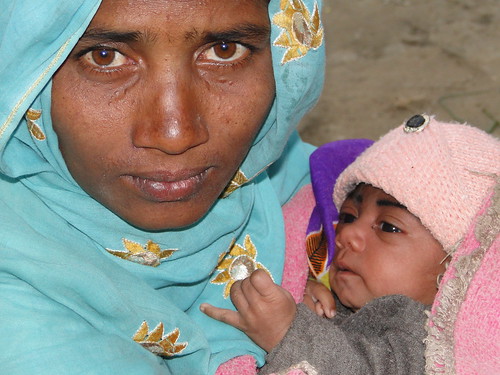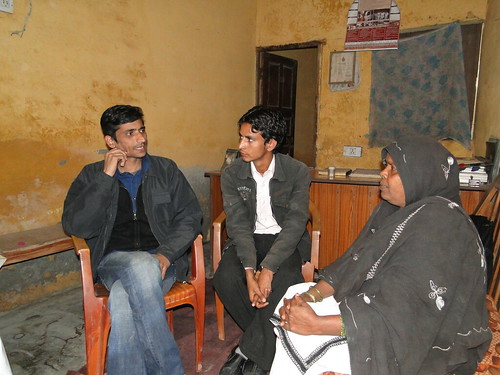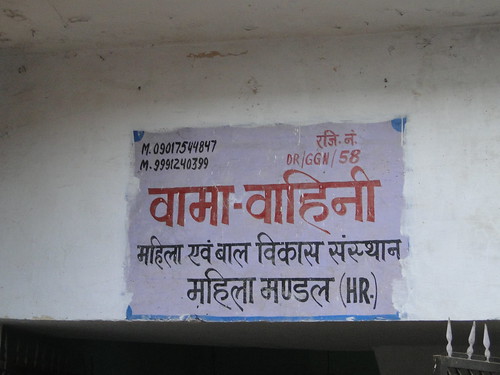TwoCircles.net
Submitted by admin3 on 27 February 2011 - 6:31pm
By Md. Ali, TwoCircles.net,
New Delhi/Haryana: The wrinkles on Noor Jahan's face betray her troubled past, making her look far older than the nearly 30 years of age which she believes she is. At the age of 18, she was brought from her native village in Barpetta district of Assam and sold to a man who after abusing her sexually and physically, sold her again to a “cruel husband” in Mewat in Haryana. Sexual and physical violence have marred her memory so much so that she was not comfortable talking about her past. After being sold and resold thrice in a trade which is called as “bride trafficking,” Noor Jahan is, finally, “happy” with her present husband with whom she has 5 children.

Noor Jahan with her newly born baby boy
Noor Jahan’s past would have been more scarred and probably, she would have been sold again and again, had it not been for the Empower People (EP), a national level gender rights campaign in the area of bride trafficking, which came to her rescue. Volunteers of EP met the family where she was sold and rescued her from there and rehabilitated her and got her remarried in a decent family.
What is bride trafficking?
“Young girls are deceived in the name of marriage by professional ‘agent’ and then they are sold to buyers. This is actually known as bride trafficking (BT). They are brought to regions like Haryana, Punjab, western Uttar Pradesh and Rajasthan. Maximum numbers of cases have been reported from Haryana,” said Shafiqur Rahman Khan, a social activists and founder of Empower People.
“These girls are kept by people as their sex slaves as well as domestic and farm labors. They are referred to as ‘Paro’ or ‘Molki’ (literal meaning ‘priced’). There is no legal as well social legitimacy of that marriage. Every trafficked ‘bride’ has been sold on average 4 to 10 times. Their price range varies from 7 thousand to 70 thousand depending upon their beauty age and sexual experience,” added Shafiq who has done many padyatras (foot march) trafficking in different parts of Haryana and Rajasthan to raise awareness about bride.
Muslim girls worst affected
Shafiq highlighted the fact that more than 80% of around 100,000 girls trafficked every year on the name of bride trafficking, are Muslims. They come from the backward districts of states with a substantial amount of Muslim population. For instance Malda, Musrhsidabad, and 24 Pargana in West Bengal, Western Champaran, Kishanganj, Motihari, Samastipur and Magadh region in Bihar, Barpetta in Assam, and Muslim concentrated districts of Jharkhand, Orissa and South India. Transit point of bride trafficking are Hirmajra, Somipat, Panipat, villages of Hathin and Nagina block of Mewat, Alwar of Rajasthan and even some parts of Delhi
Few NGOs willing to work on this issue
Shafiq further added that unfortunately very few NGO want to work on BT because “there are hardly any funds coming from fund sanctioning agencies and big international donors for this issue.”
Shafiq further said that, “Agencies also don’t want to fund projects related to bride trafficking because mainstream media has projected the issue as essentially Muslim problem having its root in the Islamic rule which allows 4 marriages.”

L to R, Shafiqur Rahman with his volunteers Saleem and Ghausia
In the context when social work has become fund and project based, no body wants to work for girls caught up in the vicious cycle of ‘fake marriage’,” Shafiq added.
Working in 7 states
Shafiq claimed that “EP, through its work in Bihar, Haryana, Punjab, Shimla, Rajasthan, Jharkhand, and Delhi, is the only organization today working in the area on a national level.”
“We are working in Rajasthan-Haryana-Punjab, MESAS and Wama Vahini is working in Mewat, Sajrephool is in Punjab, YSSA in western Uttar Pradesh,” added Shafiq.
Talking about EP’s work Shafiq said that, “first of all we locate and identify girls caught up in the vicious cycle of bride trafficking through our network of volunteers which include stringers in many places like railway stations and bus terminals and also through our network of NGOs.”
Once EP is able to locate the girl the next stage is that of her rescue from that locality from the clutches of her owner. Some times EP needs to take few local people into confidence before any rescue operation. “At times our rescue team is attacked by the local mafia which is always in nexus with local police,” added Shafiq.
“After rescuing the girl we provide post-trauma counseling if required and we see if her parents are ready to take her back. If not then we try to get her remarried or get employed some where depending upon her education level,” said Shafiq.
He wanted to establish rescue hostel where the rescued girls can be stayed until they are able to be rehabilitated at some other place but EP doesn’t have funds enough to do that.
Impact of EP’s work
Shafiq claimed that one of the most important achievements of Empower People was the proposal of setting up of Anti Human Trafficking Unit (AHTU) in Himachal Pradesh which happened after lots of lobbying with the state administration at various levels. These units will be first of its kind in India. AHTU will be established in six districts notorious for the widespread cases of bride trafficking -- Shimla, Solan, Sirmor, Kangda, Chanba and Kullu.

Vama Vahini, Empower People's sister organisation in Mewat
EP also has managed to rescue and rehabilitate hundreds of girls from bride trafficking across the country during last three years, besides several studies, research and reports on the issues which has brought a substantial amount of awareness among the general masses on the issue.
Lack of funds
Shafiq claimed that “Empower People, these days, is going through a financial crunch.” So much so that because of the financial frustrations, one of the most trusted worker of my organization, Manish Pathak, committed suicide in November 2010.”
In the absence of any funding from big agencies we are just surviving on the meager individual donations from people but we are facing a troubled times.”
Broken myth about BT
EP has managed to break many myths about bride trafficking, “One of the prominent myths in the popular conception about BT is that it’s essentially a Muslim problem, spread in Muslim dominated areas of Haryana like Mewat region; which is historically and factually untrue and we have managed to break that view,” added Shafiq who is also advisor to many NGOs. “We have highlighted that more than Mewat, BT prevails in Jind, Kurukshetra, and areas of Punjab.”
Shafiqur Rahman can be reached at srkhan83@gmail.com
http://bringtoanend.blogspot.com/
http://empowerpeople.webs.com/
http://www.stophonourkillings.com/
http://traffickinginindia.blogspot.com/
No comments:
Post a Comment